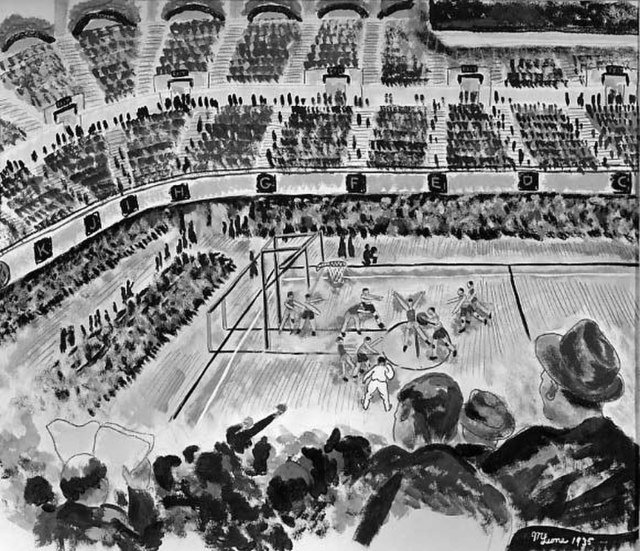As implied in my previous post, I’m in the market for a bit of extra reading. Maybe it seems a bit ridiculous for an English professor to want to read more. After all, I read for my classes, I read for my scholarship, and, gulldarnit, I even read for fun. But what I’m talking about here is a different sort of reading: I want to read to challenge myself, to learn some new ideas, in a way detached from my usual research. In other words, it’s a style of reading motivated by curiosity — the good sort, I hope — and aimed at a truer understanding of the world.
In particular, I want to begin to understand the factors at play in what I intuitively sense as a going-wrong of the world, a fundamental loss of something human in the age of digital technology. If only this were a simple thread to pull at, where a single root could be identified and pulled up. Bam, instant answers. Unfortunately I don’t buy into monocausality very easily; our current situation is not a spool of thread but a tapestry, with many interwoven factors contributing to the big picture mess. This complexity creates a conceptual nightmare for a thinker, because the sheer scale and inter-connectivity of these problems makes it difficult to isolate each issue, to even know where to begin. But begin we must. So, to give you all some whiplash through a quickly deployed mixed metaphor, I find our conundrum one that can only be approached piecemeal: brick by brick, as it were.
To help me begin to unravel this wall (how’s that for a mixed metaphor?), I’m assigning myself a syllabus of reading drawn from thinkers I either already know and trust, or ones whose names I’ve heard bandied about by people who have good judgement. In setting myself this syllabus, I hope to keep myself honest as I chug away slowly at the ideas I’m churning through my mind. Because of that purpose, I aim also to blog through my thoughts about at least some, if not all, of these books as I read them. This is private thinking made public, in the hopes that it might do a few of you reading some good, but also because I need a place to write out my own thoughts so they become clearer (and also so they don’t disappear). Without further ado, then, here are some books I plan to read over the next few years. Most are new to me, but I’ve marked any rereads with a (RR). You’ll notice a chronological slant here, toward works of the mid twentieth century. That’s in part incidental, but in part intentional, since this was the moment when critics began, in greater numbers, to examine the intersection of technology and society in critical, rather than merely laudatory, ways. There are a few more recent authors on the list, but in general I find a lot of writing about tech today to be lacking in insight, and the best writing tends to cite many of the following figures as formative, so I’m heading back to the sources. I should also note that this is far from complete: I’m sure it will grow in the process of trying to shrink it. And it goes without saying that any suggestions you might have would be very welcome, so leave them in the comments.
Books About Technology
The Technological Society and Propaganda, by Jacques Ellul
I’m currently reading Ellul’s The Technological Society after eyeing it for many years, in large part thanks to the advocacy of L.M. Sacasas, who for my money is one of the best writers on technology we have today. I’m a little more than halfway through, but I can already tell that this dense, difficult midcentury work by an elusive Frenchman is going to be one of those books that rewires by brain in important ways. As the title suggests, the book is about technology, but really more than that it’s about what Ellul calls “technique,” the drive toward efficiency in all areas of life that spreads out from technological progress more narrowly. It’s a haunting book to read in our day and age. I’m including here another book by Ellul, Propaganda, which I’ll get to if I have time. The title says it all.
Understanding Media, by Marshall McLuhan (RR)
I won’t say too much about this locus classicus of media criticism, which I’ll be reading for the second or third time to more fully grasp McLuhan’s loopy, insightful ideas about the way that media shape us. I’ll just say that McLuhan was right about nearly everything - he predicted the Internet, the death of newspapers, working from home, and a lot more. But far from being a starry eyed advocate of technology, as he’s sometimes portrayed, McLuhan was a canny visionary of the troubling aspects of over-reliance on technology. (I might also reread his much shorter, but brilliant, The Gutenberg Galaxy).
“Contraception and Chastity,” by G.E.M. Anscombe
I’ve long wanted to read some pieces by Elizabeth Anscombe, one of the most intimidating and fascinating figures of 20th Century philosophy: friend of Wittgenstein, terror of C.S. Lewis, and Catholic mother of 8. I don’t have much stomach for analytic philosophy these days, so I’m most drawn to her arguments against contraception. This is maybe where I lose a lot of non-Catholics, but I’m pretty convinced that the widespread acceptance of contraception was one of the greatest technological/moral disasters of the last hundred years, and I want to see what Anscombe has to say on the matter as I continue to formulate my thoughts (which I also want to tie into Ellul: contraception as technique).
Tools for Conviviality and Medical Nemesis, by Ivan Illich
Illich is another author who has floated into my ken thanks to trusted writers such as L.M. Sacasas. I’m fascinated by his biography (an erstwhile Catholic priest and left-anarchist), but also by his ideas that suggest the need for a radical reconfiguring in the way we relate to technology. Tools seems to be his most wide-ranging book, so I’ll start there, but I’m also intrigued, because I like weird things, by Medical Nemesis, where he suggests that society has become, not merely over-medicated, but over-medicalized. I’m not sure I’ll agree with large chunks of that thesis, but it will be challenging to think through.
The Glass Cage, by Nicholas Carr
One of the few more recent authors on here, Carr earns his place because his book The Shallows is a useful warning shot (completely ignored, of course) about the dangers of Internet use; Carr’s good enough at the level of ideas that I’m willing to overlook the slight forays into “pop science” writing style. I’ve already read that book twice, so I want to move on to his follow up book, in which he thinks through issues related to automation. Since one of my major through lines here is how we’ve traded away humanity in the pursuit of convenience, this feels like a natural book to read.
Technics and Civilization, by Lewis Mumford
Sometimes I get a bit too wrapped up in my own head, I admit. That’s why it’s useful to read works that cut against the grain of my own thinking, and Mumford’s book appears to be a good candidate here, since from what I can tell he’s less of a technological determinist than I am. This book builds from the idea of the clock as a singularly important invention, and I’m down with that notion. Plus, Mumford is the kind of historical figure — huge in midcentury America, but now forgotten outside the most esoteric circles — that intuitively appeals to me.
Books about Non-Tech Subjects
As I said, there’s more than one thread to unravel here. As much as our current situation comes wrapped up in questions of technology, there are other factors to consider, factors that may be associated with tech, but perhaps only tangentially. Here are some works I want to pick up to make sure I’m hitting multiple angles.
A Guide for the Perplexed, by E.F. Schumacher
I’ve been interested in this book for a long time but have never gotten around to it. Schumacher’s most famous book, Small Is Beautiful, acted as a founding document for the rising “localist” movement in the late 20th Century. But I’m more interested in this knotty, strange book about the philosophical underpinnings of a “scientist” society and how those underpinnings have led us astray. Strange conceptual frameworks about “levels of being”? Sign me up.
The Triumph of the Therapeutic, by Philip Rieff (RR)
If I had to choose 25 or so pages that I would force everyone to read, it would likely be the Introduction to this book, where Rieff lays out, with devastating insight, the predicament we find ourselves in: having banished “sin” as a concept, we really on the idea of the “therapeutic” as a guiding principle for leading our lives, with disastrous results. Rieff called it back in the 60s: the therapeutic is in many ways the fons et origo of our modern moral confusion, where personal experience trumps any attempt to think about ideas at the communal and ethical levels.
The Culture of Narcissism (RR) and The Minimal Self, by Christopher Lasch
Lasch is another absolutely foundational thinker for me, but it’s been years since I’ve read The Culture of Narcissism, his breakthrough book about our, well, culture of narcissism. And I’ve never read that books quasi-sequel, The Minimal Self, so I’m eager to pick it up to learn what Lasch thinks about how we can navigate the dire straits in which we find ourselves. These books pair nicely with the Rieff, as an added bonus.
The Human Condition, by Hannah Arendt
Frankly I’m embarrassed that I’ve never read this seminal work of political philosophy. Where does the time go? But I’m eager to dive into what Arendt thinks about the structures of society and how we might best flourish. Despite being written by a survivor of the Nazi regime, this is perhaps one of the more optimistic books on this list, from what I can tell.
The Need for Roots, by Simone Weil
Weil is another writer I’ve long been fascinated by, but haven’t gotten around to actually reading. She was a huge influence on two writers I greatly admire, Iris Murdoch and W.H. Auden, so that’s a pretty strong recommendation. This book seems most relevant to my current project, as Weil offers explanations, again, for what’s gone wrong with society, tracing our dilemmas largely back to “uprootedness”. My hope is that by collecting enough of these various explanations of what’s gone wrong, I can “triangulate” them and detect sympathies between them in order to complete the picture.
These are my most pressing concerns at the moment. There are plenty more books to read, I’m sure — after all, “of making of many books there is no end.” But these give me a starting place (a chance at rootedness, if you will). I’m eager to hear any additional suggestions you have in the comments, of course. For now, I’m going to continue reading The Technological Society, with the hope of getting a blog post or two up on it as I make my way through. I’ll hopefully also be blogging about various other stray thoughts I have, so stay tuned on that front as well. And happy reading!
















